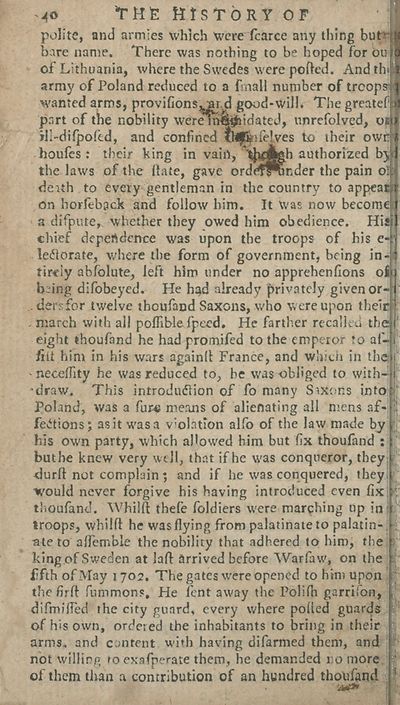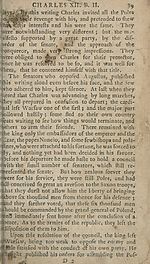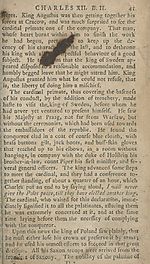Download files
Complete book:
Individual page:
Thumbnail gallery: Grid view | List view

-40 YHfc HISTORY OF
polite, and armies which Were fcarce any thing but*
bare name. There was nothing to be hoped for bufl
of Lithuania, where the Swedes were polled. And thill
army of Poland reduced to a final! number of troops*
wanted arms, provifions^ard good-will. The greatefH
jart of the nobility wereuT&giidated, unrefolved, oiu
ill-dilpofed, and confined Xhf^ifeLves to their owr|
houlcs: their king in vain, %hcwfih authorized byfj
ardefr^ndi
the laws of the (late, gave ordefr^nder the pain of
deith to every gentleman in the country to appeal
on horlebjick and follow him. It Was now becomi
a difpute, whether they owed him obedience. His
chief dependence was upon the troops of his e-
ledlorate, where the form of government, being in-
tireiy abfolute, left him under no apprehenfions oi
biing difobeyed. He h^d already privately given or-
. dersfor twelve thoufand Saxons, who were upon their
march with all poffiblefpeed. He farther recalled the
eight thoufand he had promifed to the emperor to af-
fiit him in his wars againll France, and which in the
- neceffity he was reduced to, he was obliged to with- “
•draw. This introduction of fo many Saxons into
Poland, was a fur« means of alienating all mens af-!
factions; asit wasa violation alfo of the law made by
his own party, which allowed him but fix thoufand :
butbe knew very well, that if he was conqueror, theyj
durft not complain; and if he was conquered, they!
would never forgive his having introduced even fix:
thoufand. Whilft thefe foldiers were marching up in
troops, whilft he was flying from palatinate to palatin-
ate to affemble the nobility that adhered to him, the,
kingof Sweden at laft arrived before Warfaw', on the
fifth of May 1702. The gates were opened to him upon! l1
the firft fummons. He fent away the Polifh garrifon,
difmifled the city guard, every where polled guards
of his own, ordered the inhabitants to bring in their
arms, and content with having difarmed them, and
not willing roexafperate them, he demanded no more
of them than a contribution of an hundred thoufand
polite, and armies which Were fcarce any thing but*
bare name. There was nothing to be hoped for bufl
of Lithuania, where the Swedes were polled. And thill
army of Poland reduced to a final! number of troops*
wanted arms, provifions^ard good-will. The greatefH
jart of the nobility wereuT&giidated, unrefolved, oiu
ill-dilpofed, and confined Xhf^ifeLves to their owr|
houlcs: their king in vain, %hcwfih authorized byfj
ardefr^ndi
the laws of the (late, gave ordefr^nder the pain of
deith to every gentleman in the country to appeal
on horlebjick and follow him. It Was now becomi
a difpute, whether they owed him obedience. His
chief dependence was upon the troops of his e-
ledlorate, where the form of government, being in-
tireiy abfolute, left him under no apprehenfions oi
biing difobeyed. He h^d already privately given or-
. dersfor twelve thoufand Saxons, who were upon their
march with all poffiblefpeed. He farther recalled the
eight thoufand he had promifed to the emperor to af-
fiit him in his wars againll France, and which in the
- neceffity he was reduced to, he was obliged to with- “
•draw. This introduction of fo many Saxons into
Poland, was a fur« means of alienating all mens af-!
factions; asit wasa violation alfo of the law made by
his own party, which allowed him but fix thoufand :
butbe knew very well, that if he was conqueror, theyj
durft not complain; and if he was conquered, they!
would never forgive his having introduced even fix:
thoufand. Whilft thefe foldiers were marching up in
troops, whilft he was flying from palatinate to palatin-
ate to affemble the nobility that adhered to him, the,
kingof Sweden at laft arrived before Warfaw', on the
fifth of May 1702. The gates were opened to him upon! l1
the firft fummons. He fent away the Polifh garrifon,
difmifled the city guard, every where polled guards
of his own, ordered the inhabitants to bring in their
arms, and content with having difarmed them, and
not willing roexafperate them, he demanded no more
of them than a contribution of an hundred thoufand
Set display mode to:
![]() Universal Viewer |
Universal Viewer | ![]() Mirador |
Large image | Transcription
Mirador |
Large image | Transcription
| Antiquarian books of Scotland > Kings & rulers > History of Charles XII. King of Sweden > (40) |
|---|
| Permanent URL | https://digital.nls.uk/121795765 |
|---|
| Description | Thousands of printed books from the Antiquarian Books of Scotland collection which dates from 1641 to the 1980s. The collection consists of 14,800 books which were published in Scotland or have a Scottish connection, e.g. through the author, printer or owner. Subjects covered include sport, education, diseases, adventure, occupations, Jacobites, politics and religion. Among the 29 languages represented are English, Gaelic, Italian, French, Russian and Swedish. |
|---|

